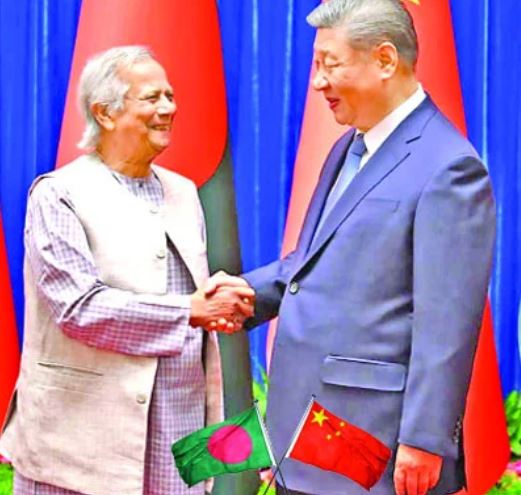Dr. Muhammad Yunus, a Nobel Peace Laureate and globally renowned social entrepreneur, embarked on a transformative four-day official visit to China in March 2025. The visit was of significant importance, not only for the advancement of bilateral relations between China and Bangladesh but also as part of Dr. Yunus’s long-standing commitment to global development. Yunus’s efforts have always been focused on reducing poverty, empowering individuals through microfinance, and promoting sustainable development. His visit to China, therefore, carried the potential for strengthening the ties between the two countries, with an emphasis on economic cooperation, education, and cultural exchange.
Background: Dr. Muhammad Yunus and His Legacy
Dr. Yunus is best known for founding Grameen Bank in Bangladesh, which pioneered microfinance—a system that provides small loans to impoverished individuals, particularly women, who are unable to access traditional banking services. His innovative approach to combating poverty through financial inclusion earned him the Nobel Peace Prize in 2006, alongside Grameen Bank. Over the years, Yunus has expanded his efforts globally, advocating for social business models that combine profit-making with social good.
Yunus’s influence goes beyond microfinance. He is a passionate advocate for entrepreneurship and has authored several books on topics ranging from social entrepreneurship to innovative solutions for poverty alleviation. In this context, Yunus’s visit to China took on added significance. China, as one of the world’s largest economies and a rising global leader, represents both an opportunity and a challenge for Bangladesh in terms of economic collaboration. Yunus’s visit was seen as a way to bridge this gap and foster a new chapter in Bangladesh-China relations.
The Visit’s Significance
The timing of Dr. Yunus’s visit was particularly strategic. The visit took place during a crucial phase in Bangladesh’s political and economic transition. As the country strives for greater economic independence and seeks to strengthen its international standing, engaging with powerful allies such as China becomes a central aspect of its foreign policy. Yunus’s trip was not only about economic co-operation but also about strengthening people-to-people connections and institutional partnerships, two vital aspects of international relations in the modern age.
In addition to strengthening bilateral ties, the visit was seen as an effort to bring attention to Bangladesh’s evolving economic landscape. Yunus’s leadership in this sphere helps position Bangladesh as an emerging market that can offer rich potential for Chinese investments and partnerships.
Dr. Yunus’s Engagement with Chinese Leadership
Meeting with President Xi Jinping
One of the highlights of Dr. Yunus’s visit was his meeting with Chinese President Xi Jinping. The meeting was held on March 28, 2025, in Beijing and marked a turning point in the diplomatic relationship between Bangladesh and China. The two leaders discussed several important issues, including Bangladesh-China economic partnership, trade relations, and financial support. A key takeaway from the meeting was China’s pledge to lower interest rates on existing loans to Bangladesh. This gesture was seen as an expression of China’s commitment to supporting Bangladesh’s economic development.
During the meeting, President Xi expressed his strong support for Bangladesh’s current political leadership and emphasized the importance of further strengthening bilateral ties. The meeting was a platform for discussing new avenues of cooperation, particularly in terms of Chinese investments in Bangladesh. President Xi suggested that Chinese manufacturing enterprises could relocate some of their operations to Bangladesh, providing a significant boost to the country’s industrial sector and creating numerous job opportunities.
The financial discussions were equally important. With China being one of Bangladesh’s largest creditors, the promise of reduced interest rates on loans provided a much-needed financial respite for the Bangladeshi government. This would help ease the fiscal pressure on Bangladesh and enable the government to channel funds into critical development sectors such as infrastructure, healthcare, and education.
Engagement with Vice Premier Ding Xuexiang
On March 27, Dr. Yunus met with Vice Premier Ding Xuexiang in a more focused discussion aimed at enhancing economic and technical cooperation between the two countries. The talks centered around how both nations could work together to achieve mutual growth. Yunus highlighted Bangladesh’s competitive advantages, such as its young workforce, strategic location, and growing consumer market. The Vice Premier expressed China’s eagerness to explore opportunities in Bangladesh, particularly in the fields of manufacturing, technology, and infrastructure.
One of the key outcomes of this meeting was an agreement to establish joint working groups that would focus on specific sectors, such as energy, agriculture, and sustainable development. This collaboration is expected to generate innovative solutions to challenges faced by both countries, particularly in terms of energy security and climate change.
Interaction with Vice President Han Zheng
Another key engagement took place with Vice President Han Zheng on March 29. This meeting focused on long-term strategic relations between Bangladesh and China. Discussions revolved around strengthening regional stability, improving trade relations, and enhancing cooperation in international forums. Vice President Han expressed China’s commitment to supporting Bangladesh’s development efforts and reaffirmed China’s position as a key partner in Bangladesh’s journey toward prosperity.
Participation in the Boao Forum for Asia
In addition to the high-level meetings in Beijing, Dr. Yunus participated in the Boao Forum for Asia (BFA) Annual Conference, which took place from March 26 to March 27 in Hainan. The Boao Forum is an influential platform for political and business leaders to discuss key issues facing the Asian region and the world. Yunus’s participation in this event highlighted the growing importance of Bangladesh in the Asian economic landscape.
At the forum, Dr. Yunus spoke on several key topics, including sustainable development, social entrepreneurship, and financial inclusion. His insights were well-received by the international community, and his remarks on the role of social businesses in alleviating poverty were particularly impactful. Yunus’s participation in the BFA provided Bangladesh with an opportunity to showcase its commitment to sustainable development and social entrepreneurship, further enhancing its image as a forward-thinking nation.
Focus on Economic Cooperation
One of the primary focuses of Dr. Yunus’s visit was to strengthen economic cooperation between Bangladesh and China. The potential for collaboration in trade, investment, and infrastructure development is enormous. As China continues to expand its global footprint, Bangladesh represents an attractive partner due to its large and youthful population, emerging middle class, and strategic location in South Asia.
During the visit, several areas of economic cooperation were explored, including:
-
Manufacturing and Industry: Chinese manufacturers have already established a significant presence in Bangladesh, and this trend is expected to accelerate. The relocation of Chinese factories to Bangladesh could lead to increased job creation and industrial growth, particularly in the textile and garment sectors, which are Bangladesh’s largest exports.
-
Infrastructure Development: China has been involved in several large infrastructure projects in Bangladesh, including the construction of roads, bridges, and power plants. Yunus’s visit opened up new opportunities for collaboration in infrastructure, particularly in the renewable energy sector, where both countries have expressed a strong interest.
-
Trade Relations: The trade balance between Bangladesh and China has traditionally been in favor of China, but Yunus’s visit aimed to address this imbalance. Discussions focused on how both countries could increase trade in areas where Bangladesh has a competitive advantage, such as agriculture, textiles, and pharmaceuticals.
Cultural and Educational Diplomacy
Beyond economics, Yunus’s visit also emphasized cultural and educational diplomacy. On March 29, he was conferred with an honorary doctorate by Peking University, one of China’s most prestigious institutions. This recognition highlighted Yunus’s global influence and his role in promoting social entrepreneurship. During his speech at the university, Yunus called for greater educational exchange between Bangladesh and China, particularly in the fields of social science and business.
Yunus’s interactions with Chinese students and scholars helped build bridges between the two countries’ academic communities. His visit underscored the importance of mutual understanding and collaboration in higher education, which can play a critical role in fostering long-term relations between Bangladesh and China.
Key Agreements and Future Prospects
The visit resulted in several key agreements, including:
-
Lower Interest Rates on Loans: China agreed to consider lowering the interest rates on loans extended to Bangladesh, providing crucial financial support.
-
Industrial Cooperation: Plans were made for Chinese companies to increase investment in Bangladesh’s manufacturing sector, particularly in textiles and electronics.
-
Education and Research: Both countries agreed to collaborate on joint research projects and student exchange programs, enhancing cultural and intellectual ties.
Bangladesh China agreements
The Strategic Importance of the Visit
Dr. Yunus’s visit to China was not only about strengthening bilateral ties but also about positioning Bangladesh as a key player in the broader Asian economy. By engaging with China, one of the world’s most powerful economies, Bangladesh is positioning itself as a center of regional influence.
During Chief Adviser Dr. Muhammad Yunus’s official visit to China in March 2025, both nations demonstrated their commitment to enhancing bilateral relations through the signing of one agreement and eight Memoranda of Understanding (MoUs). These documents spanned various sectors, including economic cooperation, cultural exchange, media collaboration, sports, and health. This strategic engagement reflects a mutual desire to deepen ties and explore new avenues for collaboration.
1. Bangladesh china agreements on Economic and Technical Cooperation
The cornerstone of the visit was the signing of an agreement on economic and technical cooperation. This agreement aims to facilitate financial and technical assistance from China to Bangladesh, supporting projects that promote sustainable development and infrastructure enhancement. While specific project details were not disclosed, the agreement underscores China’s commitment to supporting Bangladesh’s development objectives.
2. Memoranda of Understanding (MoUs)
In addition to the main agreement, eight MoUs were signed, each targeting key areas of mutual interest:
-
Cultural Exchange and Cooperation: These MoUs focus on promoting bilateral cultural activities, including art exhibitions, cultural performances, and collaborative projects aimed at enhancing mutual understanding and appreciation between the peoples of Bangladesh and China.
-
Media Collaboration: The MoUs in this sector are designed to foster cooperation between media organizations of both countries. They aim to facilitate the exchange of news, documentaries, and other media content, promoting a balanced and comprehensive understanding of each nation’s developments and perspectives.
-
Sports Cooperation: These agreements are intended to enhance sports exchanges, including organizing joint sports events, training programs, and friendly matches. The goal is to strengthen people-to-people ties and promote a healthy lifestyle through sports.
-
Health Sector Collaboration: The health-related MoUs aim to improve healthcare services through the exchange of medical knowledge, training of healthcare professionals, and collaborative research. They also envision the establishment of specialized medical facilities and the sharing of expertise in public health management.
3. Additional Announcements and Initiatives
Beyond the formal agreements, several significant announcements were made during the visit:
-
Investment Negotiations: Both countries agreed to commence formal negotiations on an investment treaty, aiming to create a more favorable environment for bilateral investments.
-
Industrial Economic Zone Development: Plans were announced to establish a Chinese Industrial Economic Zone in Bangladesh, expected to attract Chinese manufacturers and create employment opportunities.
-
Mongla Port Modernization: A commercial agreement was signed for the modernization and expansion of Mongla Port, enhancing trade infrastructure and connectivity.
-
Teesta River Management Project: Discussions were held regarding Chinese participation in the Teesta River Comprehensive Management and Restoration Project, addressing water resource management challenges.
-
Healthcare Initiatives: Plans were unveiled for the construction of a robot-assisted physiotherapy and rehabilitation center, aiming to incorporate advanced technology into patient care. Additionally, China announced a donation of a cardiac surgery vehicle to support mobile medical services in Bangladesh.
These agreements and initiatives collectively represent a significant step forward in Bangladesh-China relations, offering promising avenues for collaboration across multiple sectors. They reflect a shared vision for mutual growth and a strengthened partnership in the years to come.
Tista River West Bengal Before Entering Bangladesh
The Tista River, originating in Sikkim, flows through West Bengal before entering Bangladesh, playing a pivotal role in fostering cooperation between Bangladesh and China. With China’s growing interest in South Asia, joint development or water-sharing agreements could alleviate disputes and encourage sustainable use of the river’s resources. Collaborative irrigation projects or flood management plans could enhance agricultural productivity on both sides, fostering mutual benefits. Additionally, the Tista River presents an opportunity for trilateral discussions involving India, Bangladesh, and China, facilitating enhanced regional connectivity. Such initiatives can strengthen Bangladesh-China ties, foster trust, and promote shared prosperity in the region.
Bilateral Investment Treaties
Bilateral Investment Treaties serve as instrumental tools for strengthening Bangladesh-China relations. These agreements ensure favorable conditions for investments by protecting investors’ rights, stabilizing investment environments, and preventing unlawful expropriation of assets. For Bangladesh, BITs with China enable an influx of Chinese investment in critical sectors such as infrastructure, energy, and technology. They promote job creation, technological transfer, and capacity building within Bangladesh. For China, BITs solidify access to Bangladesh’s growing markets and its strategic position within South Asia. This mutually beneficial partnership enhances economic links and contributes to long-term development goals for both nations.
Bilateral Investment Treaty (BIT)
The Bilateral Investment Treaty (BIT) between Bangladesh and China aligns with their shared commitment to boosting economic growth. Through BIT agreements, both nations ensure equitable treatment of investors and facilitate the resolution of investor-state disputes. Bangladesh benefits from increased funding for strategic projects like the development of special economic zones (SEZs) and power plants, while Chinese enterprises gain access to promising investment opportunities. The treaty also promotes confidence among stakeholders, encouraging long-term engagements. By providing a legal framework for investment, the BIT significantly contributes to strengthening economic ties between the two countries, fostering mutual trust and development.
Comprehensive Strategic Cooperative Partnership
The Comprehensive Strategic Cooperative Partnership between Bangladesh and China elevates their bilateral relationship beyond traditional diplomacy. This partnership encompasses trade, defense, culture, and development, emphasizing mutual respect and shared goals. By fostering collaboration on infrastructure projects like bridges, highways, and power plants, Bangladesh benefits from China’s resources and expertise. A cooperative defense framework also enhances regional security. Additionally, cultural exchanges deepen mutual understanding and create stronger people-to-people connections. Such a comprehensive relationship strengthens Bangladesh’s position as a regional hub while supporting China’s broader Belt and Road Initiative (BRI) objectives in South Asia.
Development Initiatives
China’s role in development initiatives in Bangladesh significantly enhances their bilateral relations. By financing and constructing mega-projects such as the Padma Bridge and Karnaphuli Tunnel, China supports Bangladesh’s drive toward industrialization and improved connectivity. These initiatives create employment opportunities and catalyze economic growth across the nation. Furthermore, Chinese development projects often incorporate modern technology, improving local capacity and expertise. They also align with Bangladesh’s Vision 2041 goal to achieve higher-income status. Through such initiatives, China reinforces its support for Bangladesh’s progress, building a robust economic and developmental partnership.
Equitable Treatment
Equitable treatment is a core principle fostering trust and collaboration in Bangladesh-China relations. By ensuring that businesses and investments from both countries receive fair and equal treatment, economic cooperation deepens. This approach also helps minimize disputes, creating a favorable environment for trade and infrastructure development. For Bangladesh, equitable treatment ensures that Chinese investments align with national interests, empowering local industries and communities. For China, it fosters reliability and continuity in their South Asian engagements. Such fairness underscores mutual respect, laying the foundation for a balanced and sustainable partnership that remains beneficial for both nations.
Foreign Affairs
Bangladesh-China collaboration in foreign affairs reflects shared priorities in regional stability and international diplomacy. China’s support for Bangladesh in forums like the United Nations and its integration into initiatives such as the Belt and Road Initiative elevate Bangladesh’s presence on the global stage. Meanwhile, Bangladesh strengthens China’s geostrategic foothold in South Asia and the Bay of Bengal. This productive relationship also facilitates dialogue on critical global issues, from climate change to sustainable development. By aligning foreign policy goals, the two nations forge a resilient partnership that promotes peace, security, and economic growth.
Port Handling Capacity Development
China’s assistance in developing port infrastructure, particularly at Chattogram and Payra, significantly boosts Bangladesh’s port handling capacity. Modernized ports reduce congestion, optimize trade routes, and position Bangladesh as a regional logistics hub. These developments not only enhance export-import efficiency but also attract foreign investments. China’s expertise in building large-scale infrastructure ensures the implementation of state-of-the-art facilities and technologies. Enhanced port handling capacity fosters stronger economic growth for Bangladesh, benefiting Chinese enterprises as well by creating smoother trade routes. This mutual advantage underscores the deepening of the economic partnership between the two nations.
Implement the Project for Tista River Dam
The implementation of a project for the Tista River Dam is a potential game-changer for Bangladesh-China relations. By partnering on such a project, Bangladesh could address perennial issues such as floods, water scarcity, and irrigation inefficiencies. The dam would increase agricultural output and secure water resources year-round, boosting livelihoods in affected areas. China’s expertise in dam construction and financing can ensure the project’s success. For China, involvement in critical infrastructure highlights its commitment to regional development. Together, both nations can leverage this project to address pressing challenges and solidify their strategic partnership.
Teesta River Project
The Teesta River Project holds immense significance for Bangladesh-China relations, aiming to enhance water management, agriculture, and energy production. Collaborative efforts on this project could transform the Teesta basin into a fertile agricultural hub, ensuring food security and economic growth. Chinese funding and technical expertise in hydropower can also unlock the Teesta’s potential to generate electricity, addressing energy needs in Bangladesh. Such a venture would not only bring immediate benefits to the region but also strengthen the two nations’ bond by showcasing effective collaboration on critical shared goals.
Impact on India and China
The evolving Bangladesh-China relationship inevitably impacts India, as the dynamics within the region change. For Bangladesh, strengthened ties with China offer an opportunity to gain more leverage in regional politics and attract infrastructure investments. On the other hand, India closely observes this development due to its geographic proximity and shared history with Bangladesh. The delicate balance between Bangladesh’s relationships with both nations contributes to regional stability. Constructive engagement among all three can open avenues for trilateral cooperation, fostering sustainable growth and peace in South Asia.
Helping Mongla Port Authority
China’s support for improving the Mongla Port Authority has significantly enhanced trade capabilities in Bangladesh. Upgrading facilities and expanding port capacity have reduced congestion and improved efficiency, encouraging economic growth. This support enables Bangladesh to attract larger cargo volumes, benefiting industries reliant on global supply chains. For China, involvement in Mongla Port provides direct access to the Bay of Bengal, furthering logistical and economic interests under the Belt and Road Initiative. This mutual collaboration emphasizes shared prosperity and strengthens the operational ties between the two nations.
Restoration Project TRCMRP
The Tista River Comprehensive Management and Restoration Project (TRCMRP) signifies a mutual commitment to sustainable development by China and Bangladesh. This initiative focuses on restoring river ecosystems, improving water resource management, and ensuring year-round irrigation. Collaboration on the TRCMRP demonstrates China’s technical expertise in addressing environmental challenges while addressing Bangladesh’s agricultural needs. Additionally, the project aligns with broader climate resilience objectives
Dr. Muhammad Yunus’s visit to China in March 2025 marked a turning point in the relationship between the two countries. Through high-level engagements, participation in the Boao Forum, and discussions on economic cooperation, Yunus was able to lay the groundwork for a stronger, more dynamic partnership. The outcomes of the visit hold promise for both countries, particularly in terms of trade, investment, and educational collaboration. As Bangladesh continues to grow and diversify its international relationships, China will undoubtedly play a central role in its future development.





